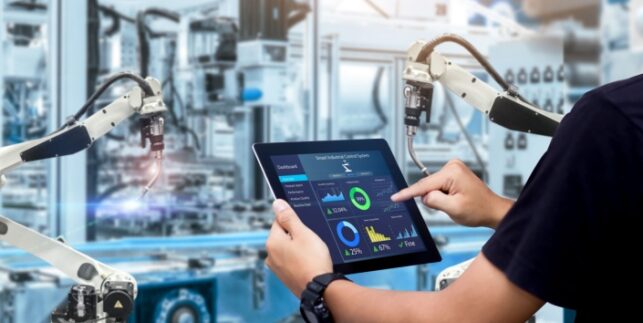How Manufacturers Can Achieve a Circular Economy With Improved Plastic Waste Management

Modern plastics manufacturers need to have effective recycling policies in place to reduce waste, placate public opinion, and reduce costs. With more and more pressure from all sides, the industry landscape has shifted away from conventional waste mitigation measures towards the development of a circular economy for plastics.
A circular economy refers to a closed-loop for plastics production where no waste is generated and no new materials consumed. While a truly circular economy is far from realistic at this time, there is room for significant improvement. With the significant consumption of raw material in plastics manufacturing and the number of plastics that end up in landfills or the environment, plastics manufacturers must do their part to steer the industry in the right direction.
While the production team can’t directly affect where products go once they’ve reached their end-users, they can control how they handle defective products.
On the manufacturing shop floor, this means implementing better plastic waste management procedures and monitoring and analyzing data as needed to ensure they’re working as planned.
Like in many other types of manufacturing, most plastic production operations have the capability to grind defective end products into a granular form for reintroduction as recycled feedstock. Plastic manufacturing carries its own unique challenges when implementing and optimizing recycling, and they need effective manufacturing waste management tools to face them.
Plastics Manufacturers Incentivized From Within and Without to Establish Circular Economy Waste Management
Today plastics are at the forefront of both public and industry discourse on recycling. While many types of materials such as metals have had a more direct economic incentive for establishing a circular economy, plastic manufacturers have only recently begun to take a more committed approach to recycling.
While circular economy waste management extends far beyond the reach of the factory floor, there is a lot for manufacturers to do.
Significant shop waste is no longer seen as acceptable by the public in general, and more intensive use of processes for recycling defective products is needed.
Upper management within manufacturing organizations can make all kinds of commitments and quotas for plastics recycling but what really matters is what’s actually happening on the factory floor. There needs to be reliable data collection and analysis in order to actively audit plastic waste management plans and ensure that policies really are being followed.
There are many different steps within the manufacturing process that play into circular economy waste management, and effective overall plastics production monitoring is the only way to gain reliable insight. Determining if policies are being followed will require accurate data on defective output, material recycled, waste, and the relationship between recycled material use and quality.
Better Plastic Waste Management Can Significantly Cut Production Costs
The social commitments are reason enough to follow through with plastic waste management, but plastics manufacturing operations have a more direct incentive as well. While there is a noted tendency for production teams to prefer using virgin feedstocks, this is far from the most cost-effective option.
Fresh materials can be up to 75% of the production cost in plastics manufacturing. When defective products are produced, recycling mitigates loss by reducing the need to purchase more raw materials. It’s important that the economics of plastics recycling is made clear at every level of the production team to ensure that the right decisions are made in manufacturing waste management.
The actual impact isn’t always obvious. Of course, there’s a cost incurred in recycling the plastic in terms of additional work and equipment, but there are also savings in both the cost of waste disposition and the cost of new materials. To develop an effective understanding of the true economics of their process, manufacturers need effective plastic manufacturing data collection.
Having reliable access information like how much and what type of plastics have been recycled or gone to waste gives companies valuable insight into how well operations are following stated policies. Along with reliable quality data from plastics production monitoring, an organization can use this information to determine what the real economic impact of recycling is.
The Challenge of Implementing Plastics Recycling With Established Recipes
Plastic waste management isn’t just a matter of cost. It is also directly linked to product quality. When end products are ground and reintroduced as recycled feedstock, the production team must consider how this is going to affect the recipe or formula in production.
Recipe management is an inherently dynamic system that must allow for adjustments and corrections based both on feedstock compositions and product quality feedback. This is a challenging enough task with predefined feedstocks but can be even more difficult when incorporating recycled feedstocks.
Adding recycled end products as a feedstock will require adjustments to bulk ingredient and dosing requirements for that run. Facilities that have multiple different recycled feedstocks available add even more complexity to this task.
Ensuring that all recycled products can be used in production is an essential part of circular economy waste management. Plastics manufacturers have limited storage for recycled feedstocks, among other concerns, that put finite constraints on how and when they can be used. Production can’t wait for the perfect opportunity to use recycled feedstocks but must be able to quickly and intuitively adapt recipes to make the best use of available recycled materials without compromising product quality.
While new developments in chemical recycling that allow for the reduction of recycled plastics to individual compounds at an economic scale will certainly play a part in circular economies for plastics, they simply aren’t at that point yet and might never be feasible for some operations. Instead, developing a stronger focus on effective plastic waste management in current processes is the best move for most operations.

Changing the way people work in factories
Request a DemoPlastics Production Monitoring, Control, Analysis, and More With Matics
Matics provides a versatile solution for plastics manufacturers to take control of their recycling policies and improve other areas of production as well. Our platform aggregates data from multiple sources to provide actionable data and analysis when and where it’s needed.
The recipe management module provides intuitive control and management of recipes for various products within the manufacturing environment. This makes adjusting for higher or lower amounts of recycled feedstocks possible as needed, along with simplifying adjustments for other raw material modifications.
The platform also features dosing system connectivity to streamline the addition of colors and other key additives during the blending process. With the seamless connection between recipes and your dosing system, you won’t have to worry about human error affecting the consistency during and between batches.
Matics also enables the production team to monitor, analyze, and optimize operations with our comprehensive quality module. Teams will have real-time access to production data, KPIs, analysis, and more. Automated alerts can streamline the process of reacting to process changes, ensuring that the appropriate individual or team has the right data, in the right format, at the right time.
For plastics manufacturing operations, Matics provides the essential oversight and management tools needed to establish more efficient and effective production. Improving and optimizing plastic waste management is far from the only way that Matics can benefit your organization. To find out more about our full range of features, you can contact our team now to book a demo.




